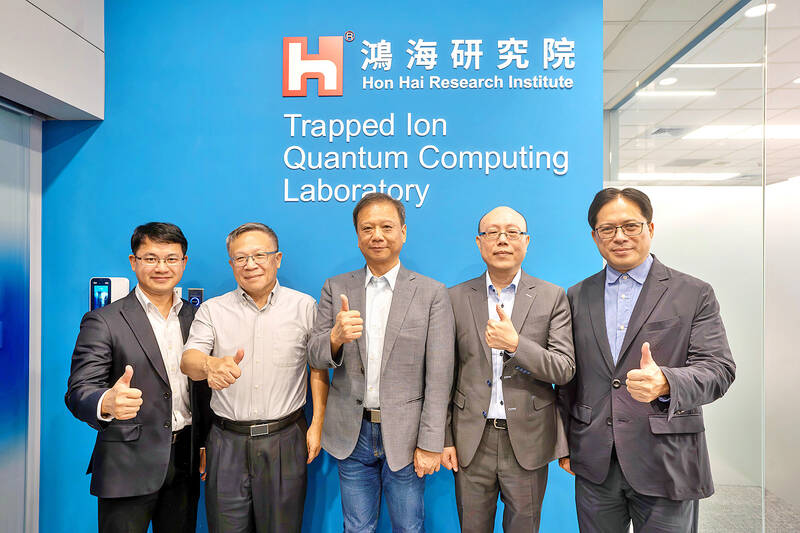Hon Hai Precision Industry Co’s (鴻海精密) research institute yesterday launched a laboratory for trapped-ion quantum computing in New Taipei City’s Sindian District (新店) as part of Hon Hai’s “3 plus 3” transformation initiative, the company said in a statement.
The “3 plus 3” initiative refers to developing three emerging sectors — electric vehicles, robots and digital healthcare — through the use of artificial intelligence, semiconductors and communications technologies, Hon Hai has said.
The lab, operated by the Hon Hai Research Institute, is at the Baogao Science and Intellectual Park (寶高智慧產業園區) in Sindian. It is the first of its kind in Taiwan, focusing on the development of efficient computing capabilities required for new generation artificial intelligence and automotive-related technologies, Hon Hai said.

Photo courtesy of Hon Hai Precision Industry Co
Trapped Ion Quantum Computing Laboratory director Lin Guin-dar (林俊達), sees quantum computing as the “holy grail” for next-generation technology development, but not something that could be achieved overnight, the statement said.
“This lab is an important experimental field for Taiwan’s industry,” Lin said in the statement, adding that the Hon Hai Research Institute would continue to invest in the field, accumulate experience and integrate talent, resources and technologies at home and from abroad.
Planned and built by the research institute for nearly two years, the lab is committed to building universal quantum computers based on trapped ions, Hon Hai said.
The lab aims to explore key technology research, including quantum control, scalable computer architectures, and chips integrating micro-ion traps and optoelectronics circuits, it said.
In addition, “this laboratory will also combine Hon Hai group’s capabilities and talents in precision manufacturing, semiconductors and packaging to accelerate quantum hardware technology development and further grow the related tech sectors,” the company said.
Hon Hai plans to introduce new-generation multi-zone ion traps at its annual Tech Day event on Wednesday at the Taipei Nangang Exhibition Center’s Hall 2.
The event is also expected to showcase the company’s progress in electric vehicles and artificial intelligence applications for smart cities and factories, as well as the latest developments in low-orbit satellites and digital health.

NEW IDENTITY: Known for its software, India has expanded into hardware, with its semiconductor industry growing from US$38bn in 2023 to US$45bn to US$50bn India on Saturday inaugurated its first semiconductor assembly and test facility, a milestone in the government’s push to reduce dependence on foreign chipmakers and stake a claim in a sector dominated by China. Indian Prime Minister Narendra Modi opened US firm Micron Technology Inc’s semiconductor assembly, test and packaging unit in his home state of Gujarat, hailing the “dawn of a new era” for India’s technology ambitions. “When young Indians look back in the future, they will see this decade as the turning point in our tech future,” Modi told the event, which was broadcast on his YouTube channel. The plant would convert

‘SEISMIC SHIFT’: The researcher forecast there would be about 1.1 billion mobile shipments this year, down from 1.26 billion the prior year and erasing years of gains The global smartphone market is expected to contract 12.9 percent this year due to the unprecedented memorychip shortage, marking “a crisis like no other,” researcher International Data Corp (IDC) said. The new forecast, a dramatic revision down from earlier estimates, gives the latest accounting of the ongoing memory crunch that is affecting every corner of the electronics industry. The demand for advanced memory to power artificial intelligence (AI) tasks has drained global supply until well into next year and jeopardizes the business model of many smartphone makers. IDC forecast about 1.1 billion mobile shipments this year, down from 1.26 billion the prior

People stand in a Pokemon store in Tokyo on Thursday. One of the world highest-grossing franchises is celebrated its 30th anniversary yesterday.

Zimbabwe’s ban on raw lithium exports is forcing Chinese miners to rethink their strategy, speeding up plans to process the metal locally instead of shipping it to China’s vast rechargeable battery industry. The country is Africa’s largest lithium producer and has one of the world’s largest reserves, according to the US Geological Survey (USGS). Zimbabwe already banned the export of lithium ore in 2022 and last year announced it would halt exports of lithium concentrates from January next year. However, on Wednesday it imposed the ban with immediate effect, leaving unclear what the lithium mining sector would do in the